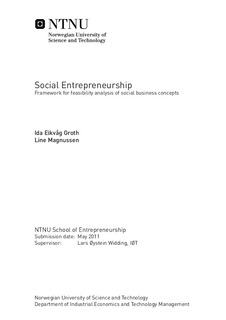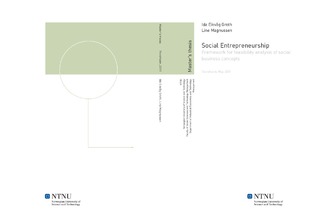| dc.description.abstract | ABSTRACTPURPOSEWith the increased interest in social entrepreneurship demonstrated within business schools and academic environments, the adaption of existing academic entrepreneurial constructs for social entrepreneurship applications becomes relevant. The purpose of this thesis is to develop additional tools to the traditional feasibility analysis. The tools will be specifically directed at technology-based concepts, due to the increased employment of technology-based products to solve social problems, in combination with the authors engineering background, and the lack of academic contributions in this area.APPROACHA grounded theory approach is employed, in which unstructured interviews are used to collect data on the topic of social entrepreneurship from practitioners and academics. New theory is then developed through a discussion divided into three distinct parts, on the basis of empirical findings and existing literature, before new data is collected through a review of the proposed tools.CONCLUSIONSA total of seven analysis tools are introduced, where some are new constructs, while others are based on existing ideas, or even existing models introduced into a new context. A main characteristic of the tools is that they are not concerned with previously established and distinct sections of feasibility analysis, but rather address the interception between the established analysis components. This is the result of the discovery that the success of social business ideas seem to depend on the ability of the entrepreneur to maintain an overarching market and customer focus, which is infused in every aspect of the proposed venture, thus erasing the division between the Market and Industry section and other established sections of analysis.IMPLICATIONSThe main implication for analysts is the opportunity to discover fundamental opportunities and challenges in the process of solving a social problem by bringing a new product to market through the establishment of a new organization.FURTHER RESEARCHFurther research should include testing of the new tools in actual analysis of new ideas, as well as implementation in a complete analysis framework | nb_NO |

